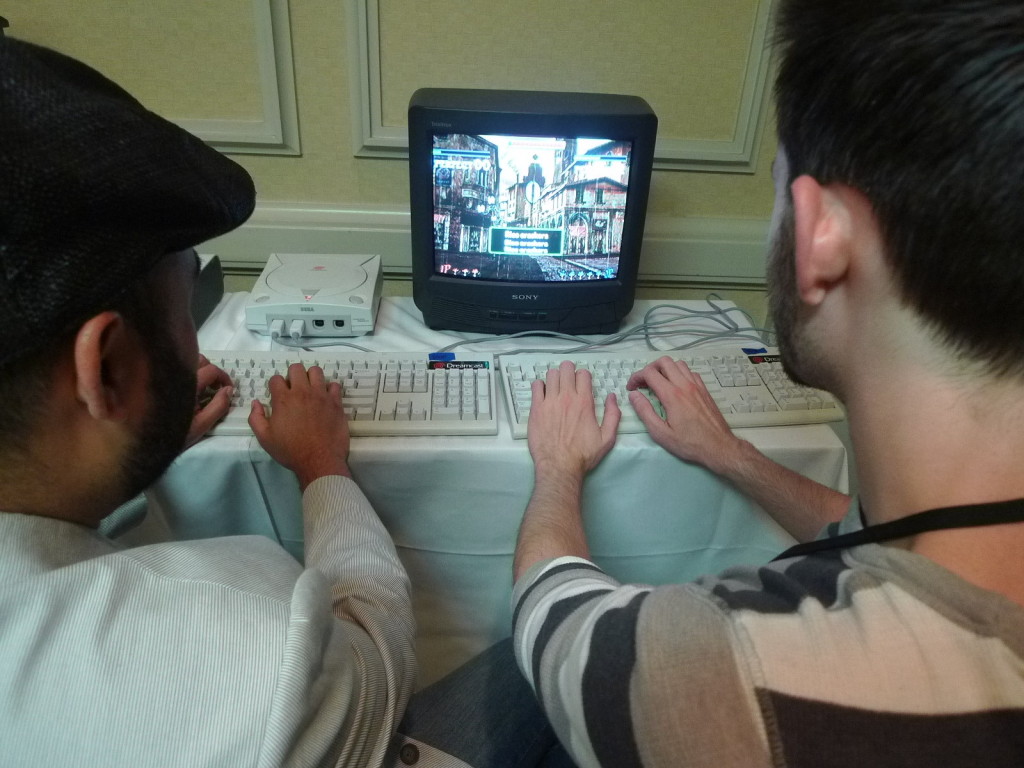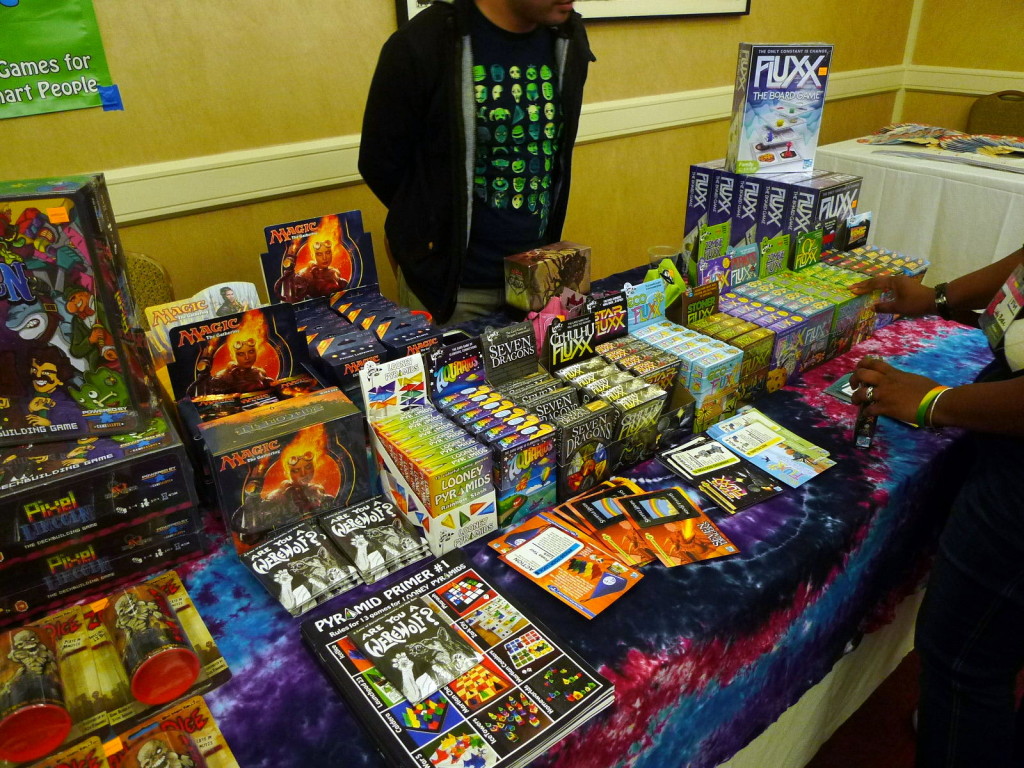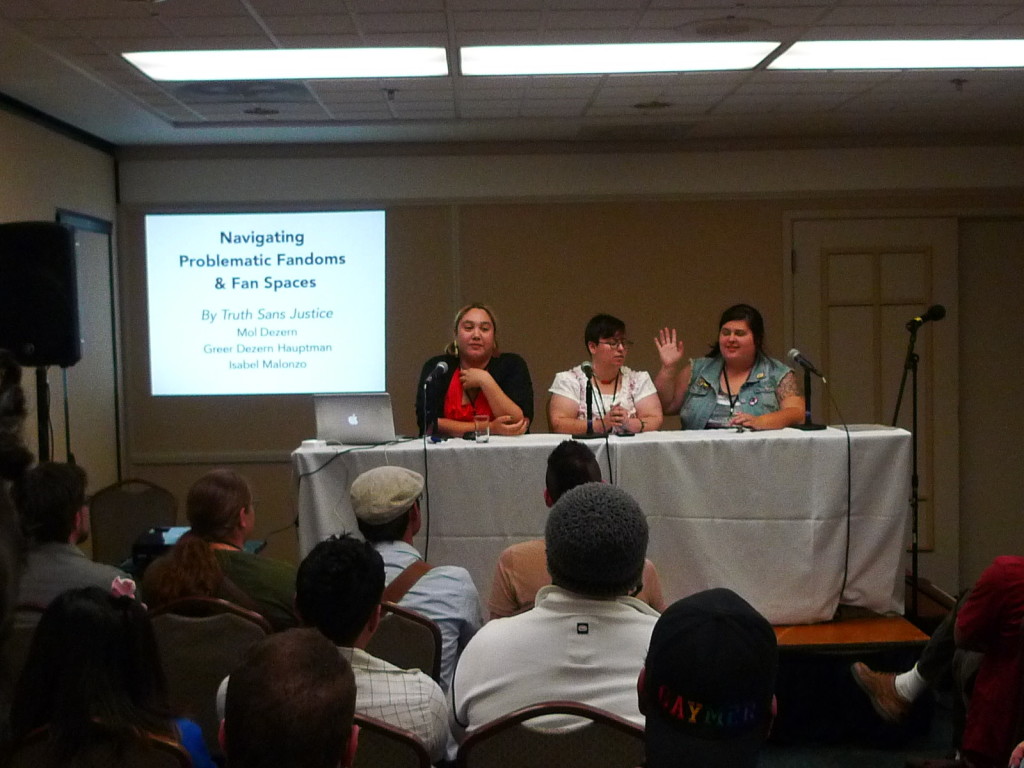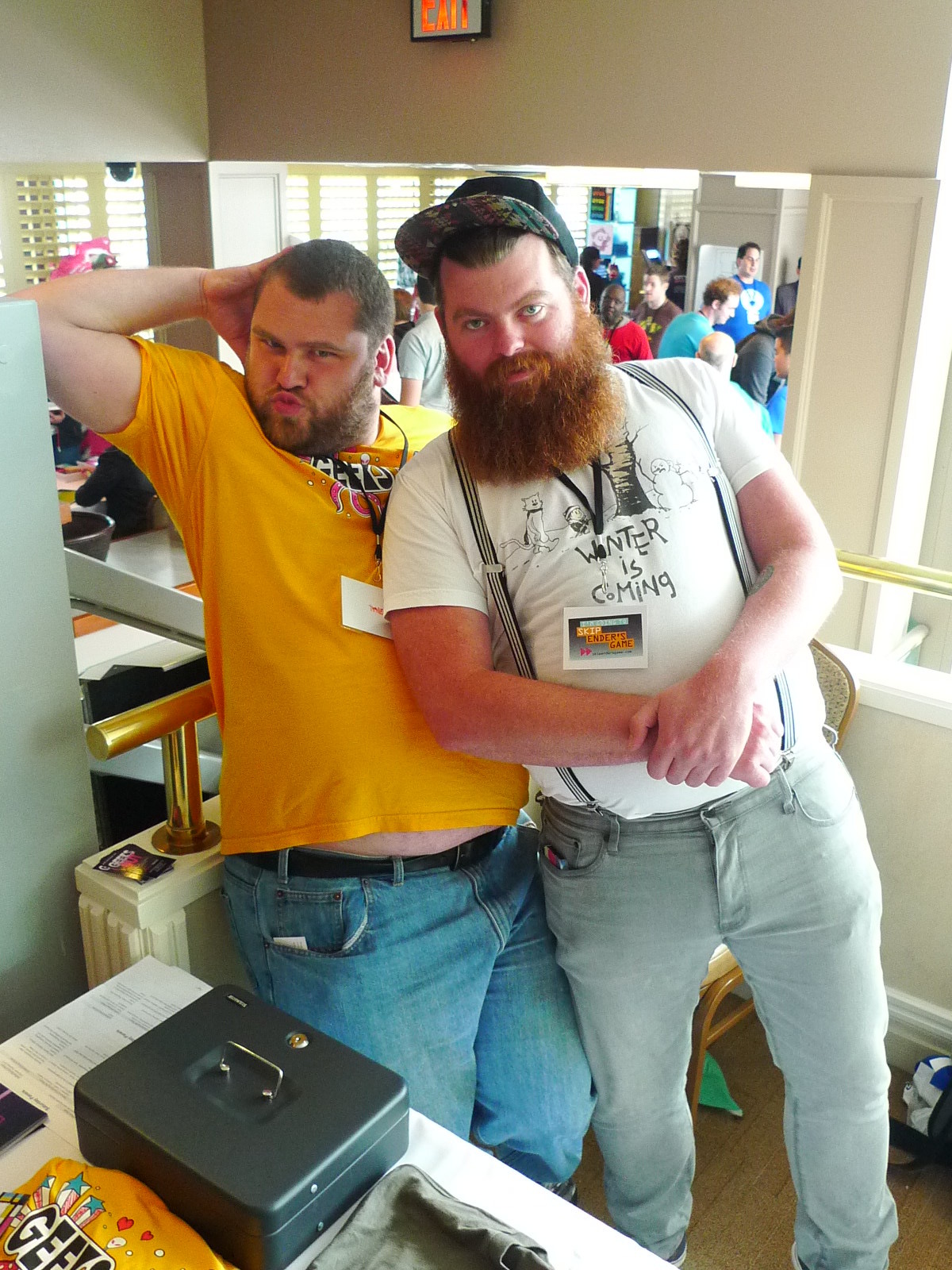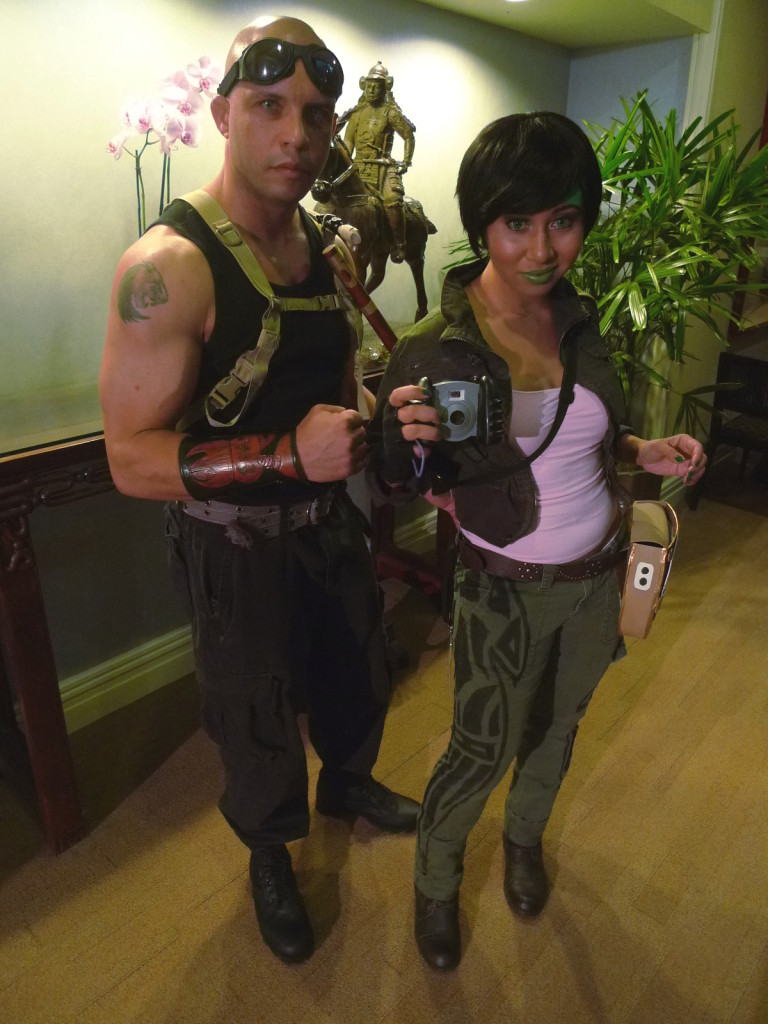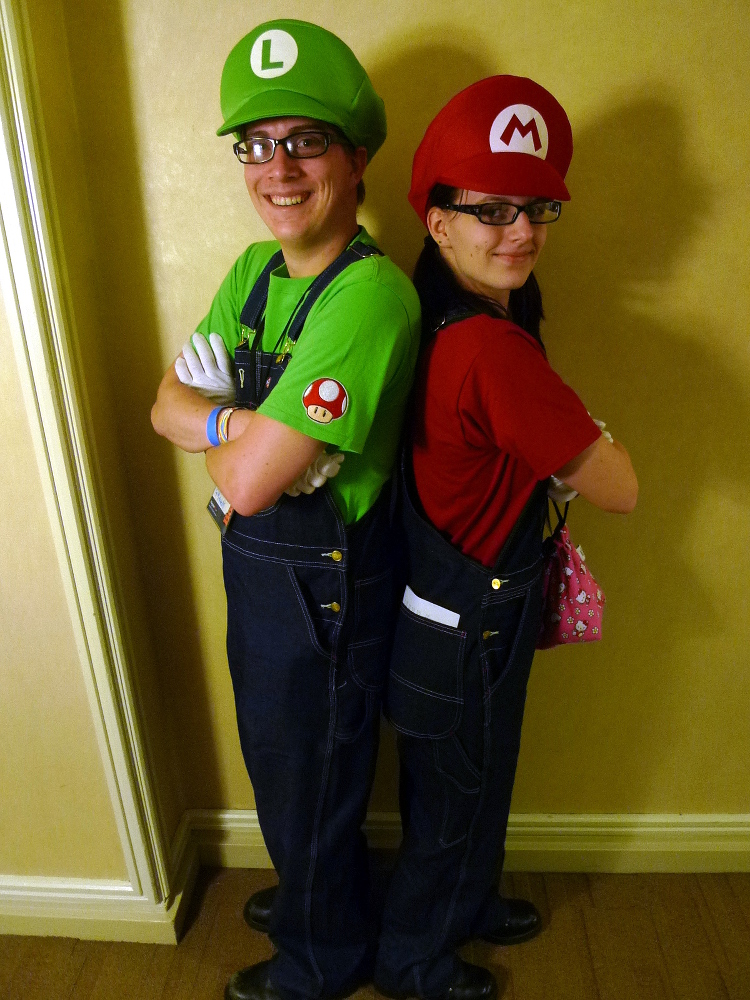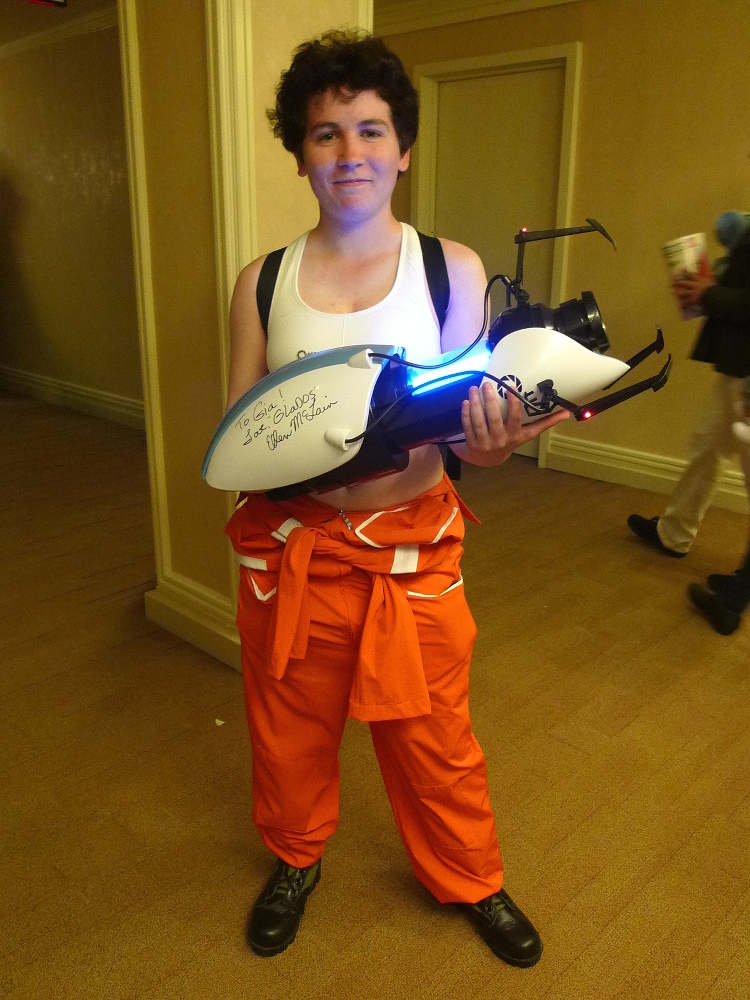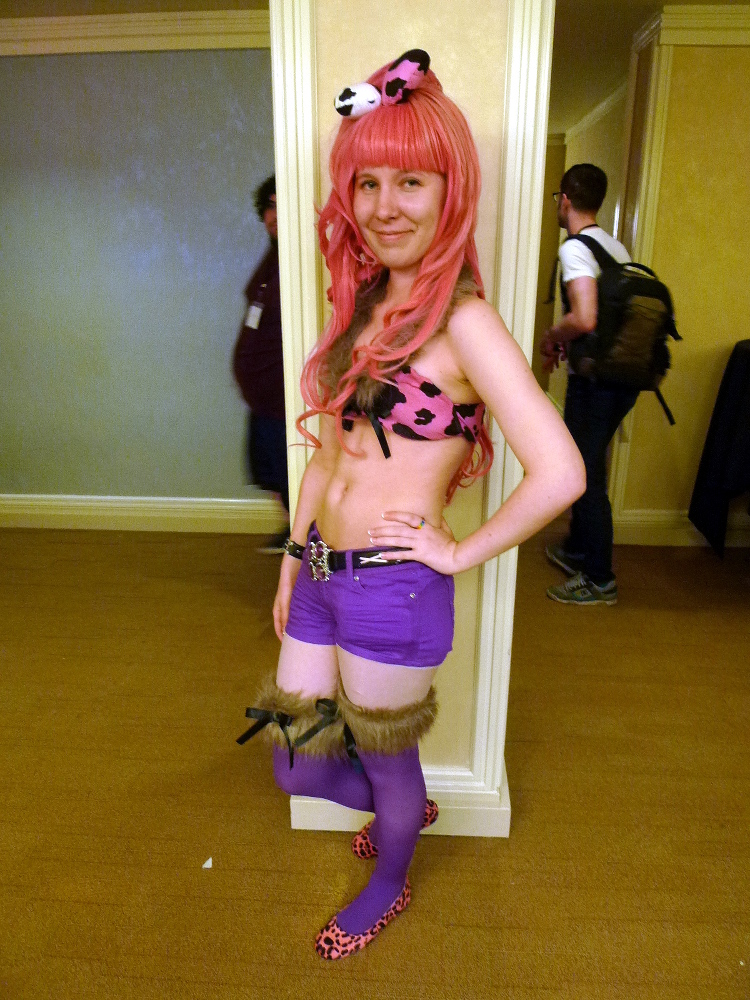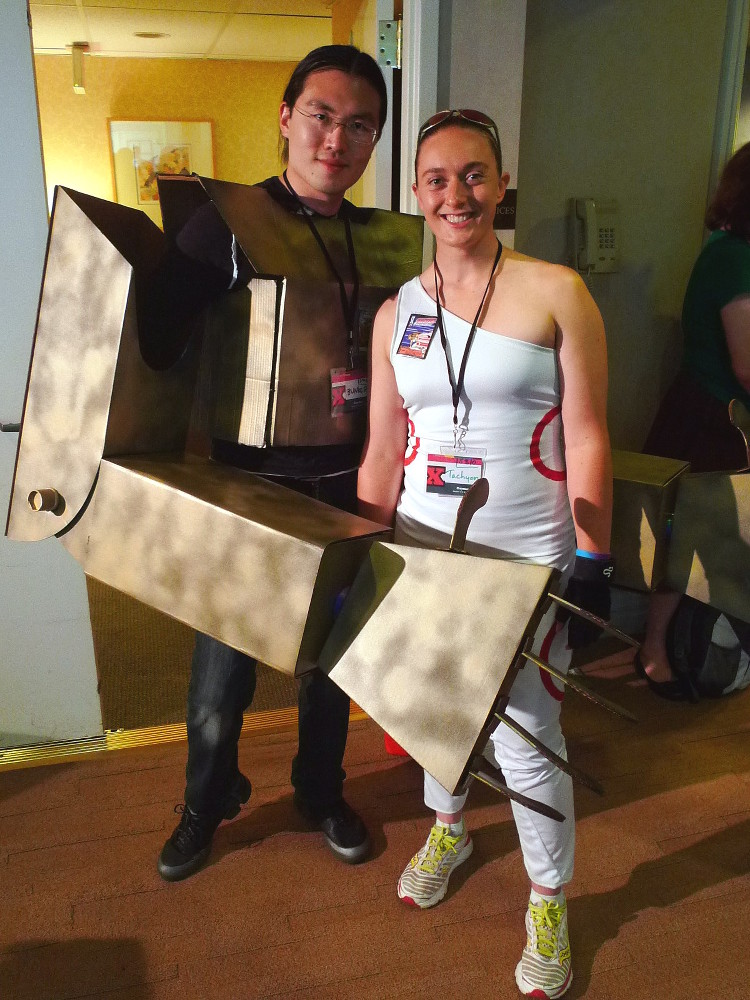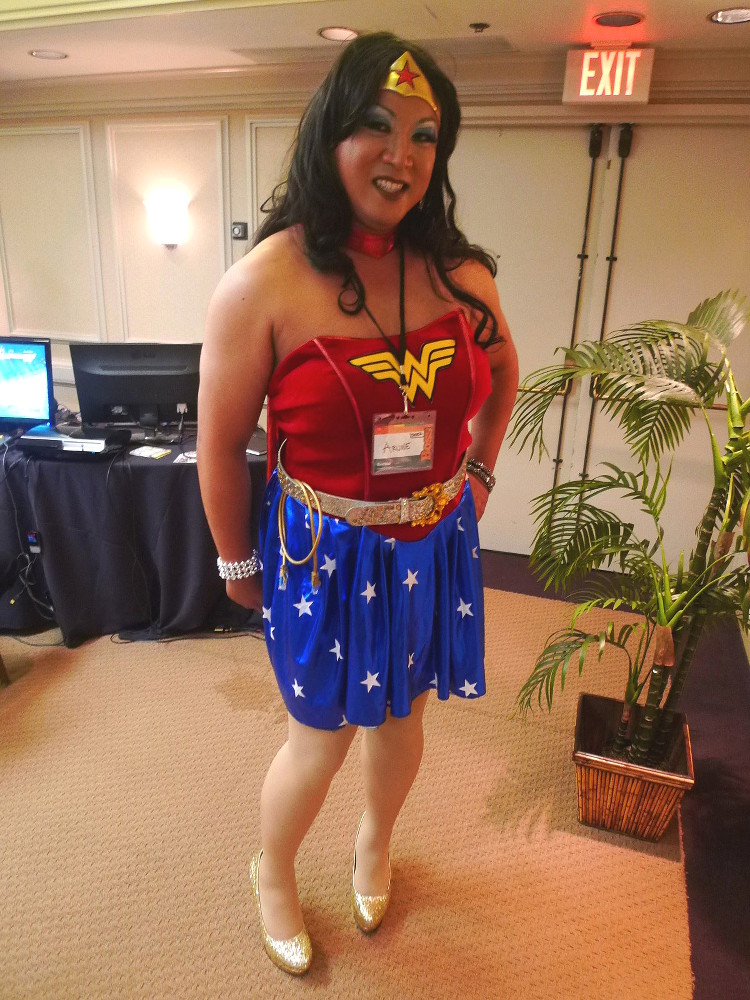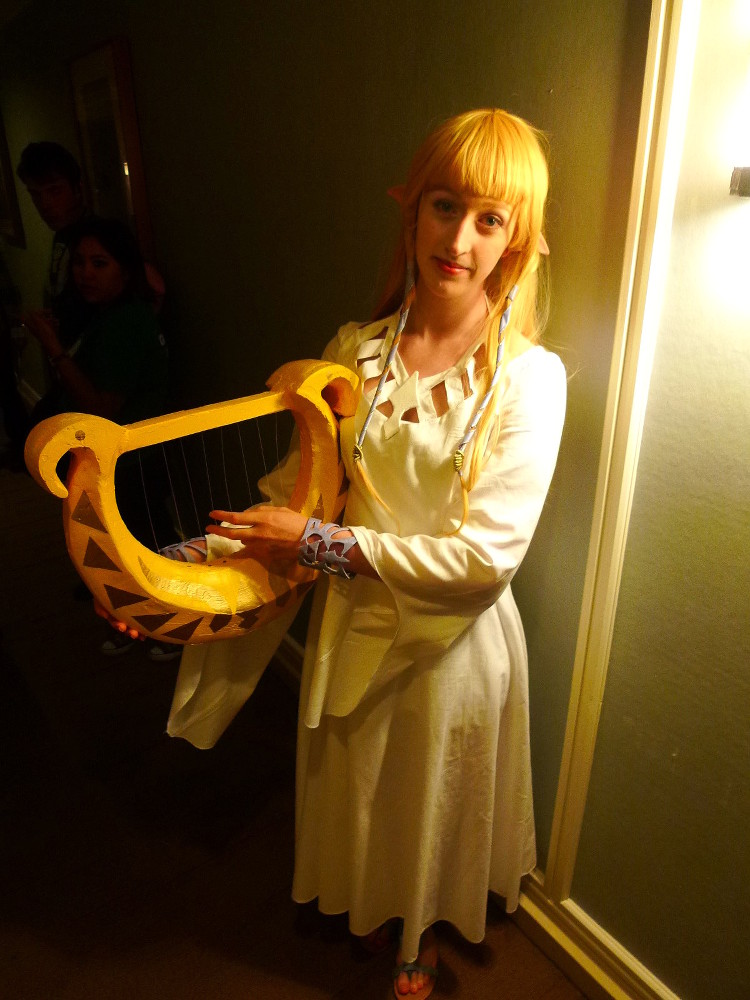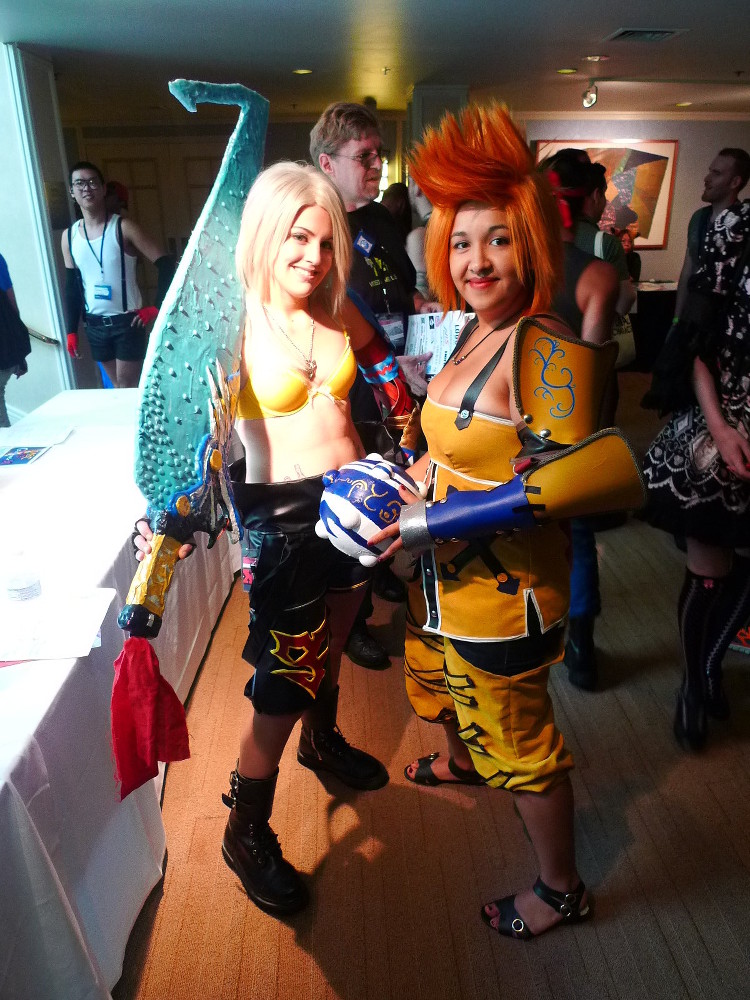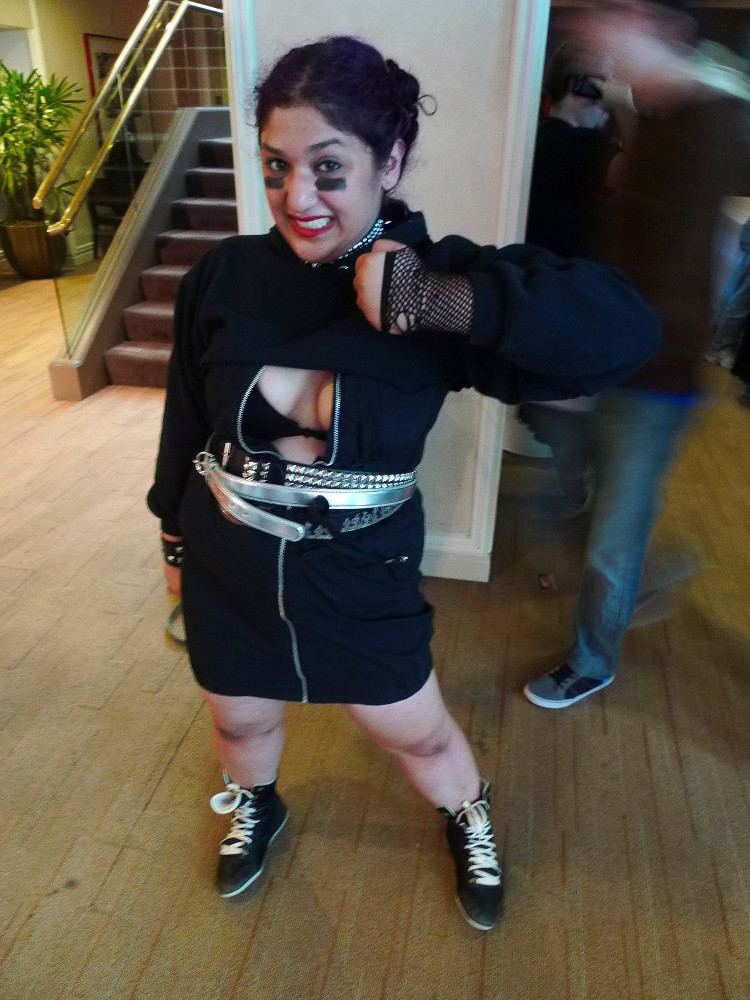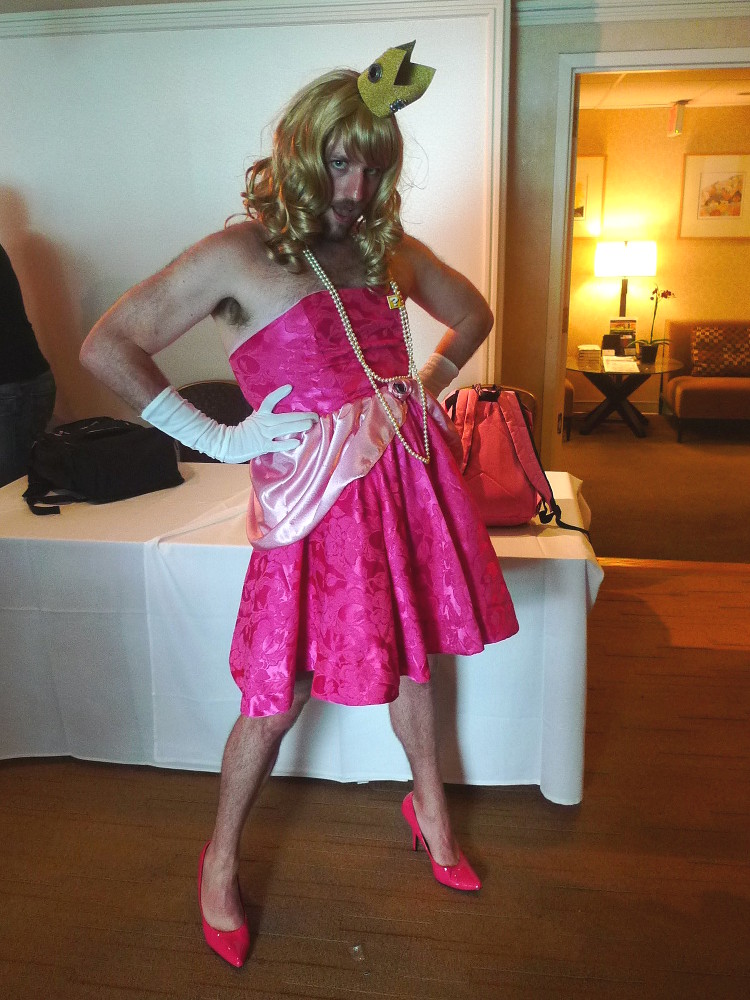This past weekend, the inaugural GaymerX convention took place in San Francisco’s Japantown. Developed by Matt Conn, the event found its footing through Kickstarter support, becoming the first convention catering to and celebrating LGBTQ gamers. The weekend included thoughtful panels, table top and card gaming rooms, a separate room of video games on a variety of platforms, exhibit areas with art and merch, and at least one marriage proposal that we know of. The con also gave attendees the opportunity to show off their cosplay and to meet some industry creators noted for their dedication to character diversity and representation in gaming.
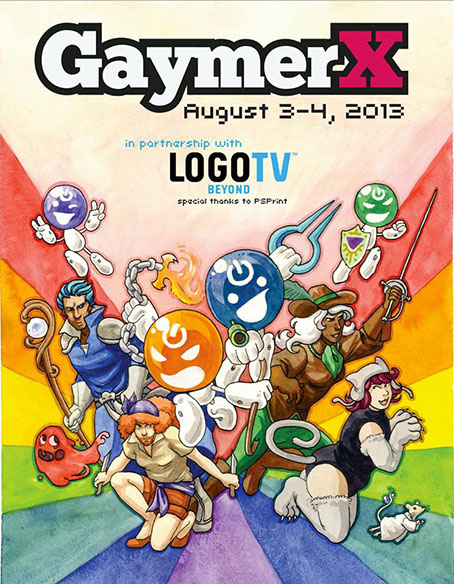 Like any effort in its beginning stages, GaymerX had some logistical elements of chaos: lobby traffic was sometimes a challenge, the artist tables were a bit scattered about, and the air conditioning at the Hotel Kabuki was very temperamental. But those were minor factors that more than likely presented the organizers with a learning opportunity for how to improve things for 2014. (It’s been confirmed, by the way, that the convention will be happening again next year!) The excitement was palpable. It was clear that this event was a much needed response to the fact that bigger geek conventions often don’t feel like an inclusive or particularly safe space. Although more and more organizers are implementing anti-harassment and discrimination policies, there is still a disconnect within the gaming fan culture. Some have argued that having a separate convention for gaymers is just a form of self-segregation, but that’s quite untrue. Instead, this convention provides an enjoyable experience, an opportunity for many gamers to find emotional support to help them become more vocal about their needs and wishes within the gaming space, and it also serves up proof that there is, in fact, a huge and growing contingent of gamers who identify as LGBTQ. A message that was echoed by many panelists is that the most simple, straight forward form of activism is to simply make your presence known.
Like any effort in its beginning stages, GaymerX had some logistical elements of chaos: lobby traffic was sometimes a challenge, the artist tables were a bit scattered about, and the air conditioning at the Hotel Kabuki was very temperamental. But those were minor factors that more than likely presented the organizers with a learning opportunity for how to improve things for 2014. (It’s been confirmed, by the way, that the convention will be happening again next year!) The excitement was palpable. It was clear that this event was a much needed response to the fact that bigger geek conventions often don’t feel like an inclusive or particularly safe space. Although more and more organizers are implementing anti-harassment and discrimination policies, there is still a disconnect within the gaming fan culture. Some have argued that having a separate convention for gaymers is just a form of self-segregation, but that’s quite untrue. Instead, this convention provides an enjoyable experience, an opportunity for many gamers to find emotional support to help them become more vocal about their needs and wishes within the gaming space, and it also serves up proof that there is, in fact, a huge and growing contingent of gamers who identify as LGBTQ. A message that was echoed by many panelists is that the most simple, straight forward form of activism is to simply make your presence known.
The panels I attended were informative for anyone who works in the industry and/or considers themselves an ally, and from the reaction and conversations that happened during the various talks, it was clear that most people in attendance found the experience cathartic and empowering. For those of you who were unable to make it due to geographic reasons, financial concerns, or the fact that you simply didn’t know about the event, we’ve got for you some panel recaps, links to artists and Kickstarter projects you might want to know about, and a few cosplay photos.
On Saturday, Rick joined me early in the morning and we picked some panels we wanted to attend, after briefly wandering through the exhibit areas. The first panel we visited was Electronic Arts: Why We Think It is Important To Create More LGBT Inclusive Games. (Big thank you to Rick, who scribbled copious notes during some of the panels and transcribed them for me.) The panelists were Jessica Merizan, Community Manager for Bioware; David “Rez” Graham, AI Programmer with EA, working on Sims; JM Sudsina, EA Assistant Producer Intern; and David Gaider, Head Writer, Dragon Age, Bioware.
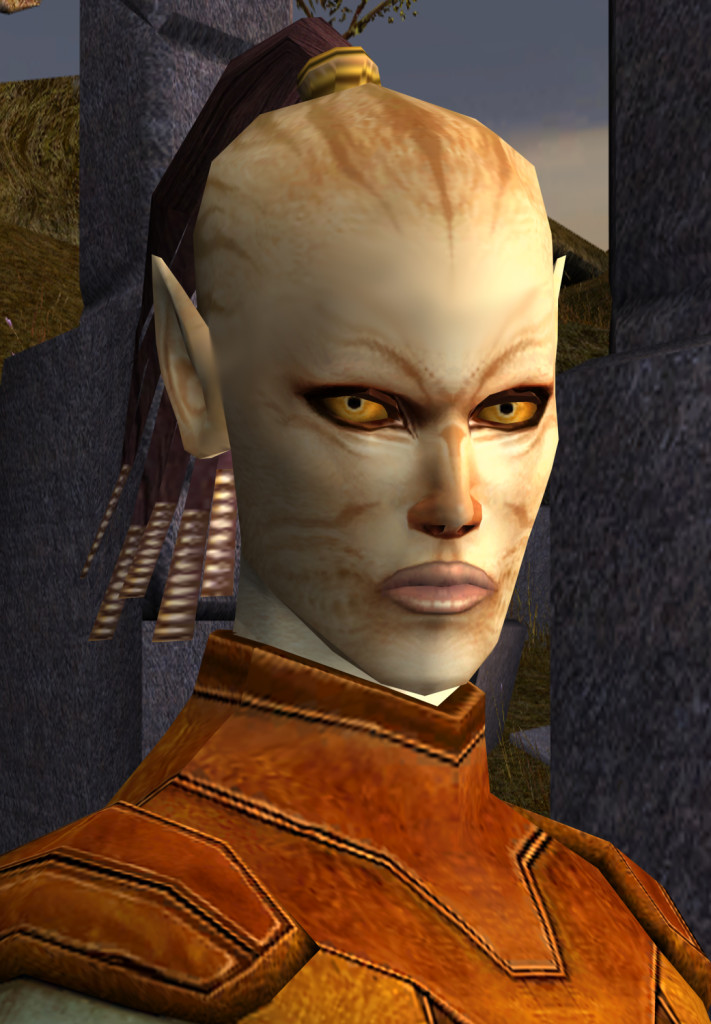
Juhani, Knigts of the Old Republic. Image from Wookieepedia
The first question to kick off the discussion was to look at the challenges the panelists have encountered when it comes to including LGBTQ character. Rez Graham mentioned that incorporating such characters was never a question of whether it should be done, but how it should be done. Still, for a long while there has existed an assumption that such implementations wouldn’t be accepted, so they were handled subtly. David Gaider recalled the development of Knights of the Old Republic in 2003, and the inclusion of Juhani, a lesbian side character. Her sexuality was never at the forefront and was only inferred through dialogue choices. Not openly addressing LGBTQ character representation, however, began to seem like conspicuous avoidance.
Amid the discussion of demographics and audience perceptions, JM Sudsina expressed how fortunate he felt, being of a younger generation, to have gone through a coming out experience at the same time as more games began to incorporate characters and story arcs representative of LGBTQ identity. Graham, moved by Sudsina’s story, admitted that as an AI developer, he sometimes loses perspective of the human impact his work has and these stories help him. Gaider and Merizan relayed some letters and messages they received from gamers who expressed gratitude for having had their gaming experience be an important element in their coming out experience. (One young man ended up having a supportive conversation with his brother while playing Dragon Age: Origins, while another woman, already in her 40s, finally came out and fell in love with a woman she met on Twitter because of their love of Mass Effect.)
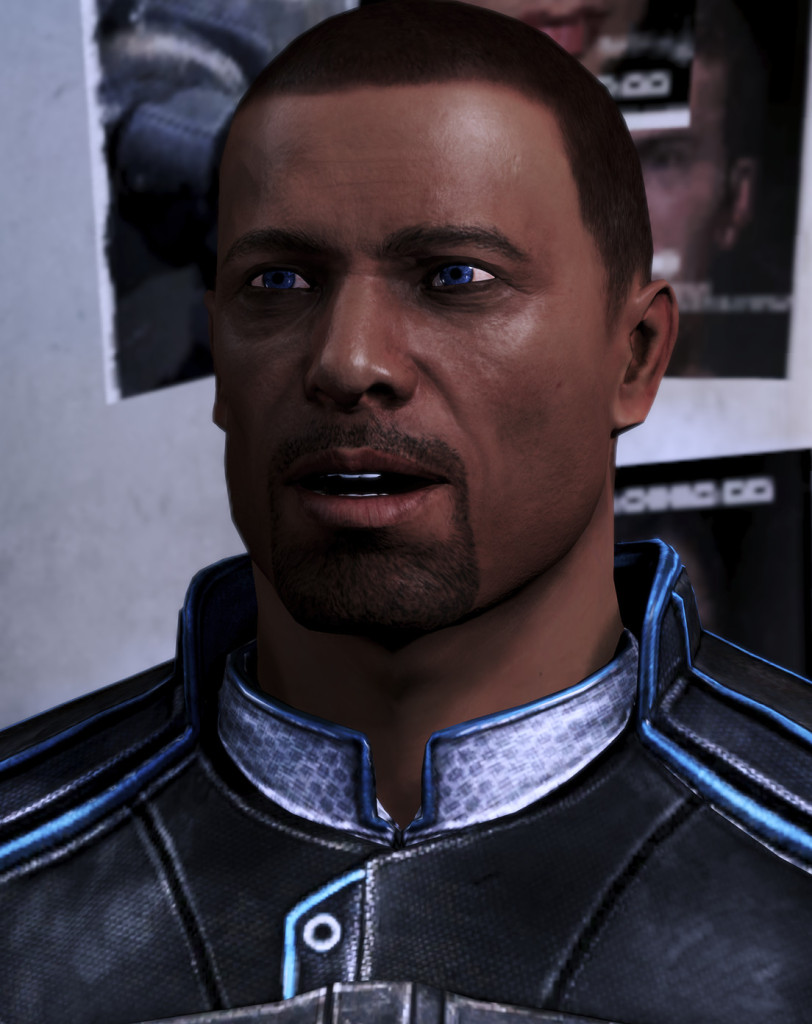
Steve Cortez, Mass Effect 3. (Image via Mass Effect Wiki)
When it comes to incorporating LGBTQ characters into games, Gaider feels it’s important to make sure that their sexuality isn’t the crux of who they are, but rather one aspect of the whole character. An example he referenced was Bill in Naughty Dog/Sony’s The Last of Us. A skilled mechanic and a hermit with strained relationships, he just happens to, offhandedly, make references to his former partner, Frank. None of the other characters in the game are taken aback by this, and his relationship is handled in a casual way. Another character is Cortez n Mass Effect 3, a “man’s man” and a consummate soldier who just happens to be gay and can be romanced by the player’s male version of Commander Shepherd.
Still, there is a certain amount of shouting that happens on the Internet when it comes to LGBTQ characters, but Merizan believes that it’s not the majority, but rather an overly-loud, concentrated minority that’s doing the shouting. In her efforts at Bioware, she is working with her team on some initiatives they hope will improve not just the interactions on Bioware forums, but hopefully the tone of online gaming communities at large. Gaider added that there is a need to tell the prejudiced and hateful loud component, “You’re the one with the problem; you’re the one that needs to get over it.”
Discussing what they would like to still see changed and improved, Merizan expressed her wish to help dismantle the notion that sex and gender are binary concepts. Instead, she wants to see a full spectrum represented in games. While the conversation is changing rapidly among publishers and developers, and there is a growing awareness that games have social responsibility, Gaider feels that there is still need to improve policies on a company level. Inclusion of the full spectrum of humanity will go beyond tokenism if a company makes an effort across its entire line to represent the diversity of human experience. During closing questions, an audience member asked what it would take to have a canonically gay protagonist (i.e. one who isn’t just gay due to player choice). Gaider admitted that it’s going to be difficult, as marketers hold a lot of power over content, and they need to makes some big changes to their attitudes. Merizan said that there is a need to vote with your wallet, as the change has to happen both at the company policy level and on the consumer level. At the end of the day, she said, “Publishers aren’t bigots – they’re capitalists.” Sudsina agreed, saying that the culture is changing, and if the fanbase wants it, it will happen. Graham suggested that it may have to be a stealth reveal, similar to Samus Aran in the original Metroid. In the game, you spent the entire time playing with a tough, mysterious character, and if you beat the game right, there was a reveal at the very end that the hero was in fact a woman. Gaider then added that it may in fact be the indie game scene that really helps cause a shift, with a breakout indie hit that major companies would see and then want to jump on the bandwagon.
After the panel, Rick and I wondered around, looking at the art, merchandise and video games. In the gaming room, Rick was especially excited to play a bout of The Typing of the Dead with Kit, a gamer we’d just met. The room was very popular, constantly filled with people moving from table to table to play some of their favorite classics. Upstairs in the Exhibitor Hall, we were excited to see a table selling card games from Looney Labs, makers of Chrononauts – an awesome game about time travel that is worth checking out – and the Fluxx series. And although I’m not so much a wearer of t-shirts with graphic designs on them, I had to join Rick in admiring and giggling over some of the cute geek designs at the Shark Robot booth. Another game that looked intriguing was Sentinels of the Multiverse, a table top game that combines comic book storytelling, dynamic characters, and cooperative play.
After lunch and wandering around, talking to awesome cosplayers and vendors, we went to the panel Awkward Silences: Navigating Problematic Fandoms and Fan Spaces. The three panelists – Isabel Malonzo, Greer Dezern Hauptman, and Mol Dezern – presented a fantastic, thorough discussion that blended academic thought with fandom language. The understandable motivation behind the panel is the fact that being a part of a fan experience, one can often run into unsafe and uncomfortable encounters in an otherwise great community. How can fans reconcile those frustrating experiences while still being able to enjoy the things they love? Moreover, fans can often experience a sort of “whiplash,” a feeling of betrayal, when they find out that the creator who stands behind the work fans really admire actually turns out to hold some very hateful and unwelcoming views. (Orson Scott Card and The Ender’s Game controversy is a good example.) In laying out the discussion, the panelists – who, as a group, go by Truth Sans Justice – explored the various spaces LGBTQ gamers (and others) occupy, both physically and virtually.
The most obvious example of a physical space frequently shared by geeks would be a convention. Many of the major conventions can be exclusionary by their nature, mostly dominated by straight white males. But even niche spaces like Yaoi-Con, which seem inclusive on the surface, also have a problematic layer, when one considers the element of fetishization of the Other by the majority. (In this example, straight women fetishizing gay male romance.) Virtual spaces, like online forums or mailing lists, are often a form of escape from physical spaces that might be obviously unsafe, or require caution. But even there, in a place that is expected to be safe, just a few instances of casual exclusion through homophobia and racism can cause one to withdraw from a community full of otherwise positive interaction. The panelists recommended that a solution, if possible, is not to leave the virtual space, but to carve out a specific, safer sub-space within it, staking your claim as wanting to remain a participant, while still firmly stating that there is room for improvement. (Think Reddit, which catches a lot of flack and often rightly so, which also has a good deal of sub-reddits that provide a supportive environment for specific groups of people.)
In resolving the problematic fan experience, Truth Sans Justice say that the first step is simply being present and visible, and talking about one’s experience so as to make it known. Throughout the discussion, the panelists reiterated that nobody should be expected to go beyond their comfort zone, and that it’s OK to step away. (Something that we also stand behind.)
Making a point to explain that tone policing isn’t the best thing, and that emotions of various degrees are justified, Malonzo expressed that meeting hostility head-on while remaining calm and logical can be the most effective strategy. However, anger and frustration can be satisfying and cathartic, nor is it any one person’s responsibility to educate the masses. A less taxing mode of engagement is to share links and reblog content that illustrates others’ experiences and expresses your opinions in a thorough way. In closing the discussion, the topic of allies was brought up. The most important thing for allies to remember is that the privilege they hold offers them the perspective that can help the very same people with whom they’re allied, but it should never be done to such an extent as to overshadow the experience of others.
There were plenty of other panels that covered a variety of topics. Game creatrix Anna Anthropy led a workshop on making a simple personal game using Twine, a free hypertext tool for producing interactive stories. In their panel Building Queer Gaming Communities, Seattle’s Queer Geek! event organizers Benjamin Williams and Charlie Logan discussed their experience putting on a party that has grown in popularity over the years and has pretty much become the LGBTQ event to go to during Pax. They talked about the various ways to help grow the community, such as starting by hosting virtual meetups through Google Hangout if distance is a challenge, and they also responded to some questions on intersectionality (the inclusion of POC and disabled geeks, and making events more welcoming and accessible to them.)
Probably the most talked about panel from Saturday, however, was the two-hour session Voice Acting 101, presented by husband and wife Ellen McLain (GLaDOS, Portal Series) and John Patrick Lowrie (The Sniper, Team Fortress 2). The workshop culminated with McLain leading a sing-along of Still Alive from Portal, but with a surprise twist: a final set of verses had been “uncovered” and turned out to be the most delightfully geeky, romantic marriage proposal. GayGamer.net recorded the video and also interviewed the newly engaged couple.
Although we didn’t stick around for the rest of the evening, GaymerX attendees were later treated to a concert and had the chance to mingle and dance with friends and strangers, which explains why perhaps on Sunday, the pace seemed a little bit more subdued (but no less buzzing with excitement.) I returned to GaymerX to check out a couple other panels and maybe try out some table top games. The first panel I attended was a presentation given by games critic and journalist Mattie Brice, How Queerness is Changing Game Media. An impeccably organized and eloquent speaker, Brice gave a half hour slide show presentation and took questions on how games media approaches reporting on LGBTQ issues, and what gamers can do to help impact change. Brice first asked the audience to raise their hand if playing a video game was the first time they could present their queer identity, and a large number of people in the audience responded. This illustrates the need to debunk the perception of “extra effort” needing to be made by publishers to market games with LGBTQ characters, since there is clearly a growing demand. Class certainly impacts games marketing and reporting, since there is a higher chance that a minority group is also going to be less financially equipped to spend a lot of money, and marketers consider underrepresented gamers a risk factor.
So what can be done to help change that perception? Brice believes in the potential power and impact of the new type of “gonzo” journalism that is popping up, with a lot of independent blogs, social critics, and writers who express underrepresented views. But without support, a lot of aspiring minority voices “drop off the map.” LGBTQ gamers who are unable to chip in a few dollars on their favorite bloggers’ websites can help by sharing content they support, far and wide. With bigger, established publications, gamers should write editors to ask for certain perspectives to be covered that aren’t included in the conversation already. When asked how allies can best help the cause, Brice said she’d like to see more allies expressing stories of their privilege, and more specifically, the mistakes they made and how they learned better from them. For LGBTQ gamers, however, she admits that becoming a vocal critic can be a scary and sometimes dangerous task. “Being an activist is being present,” Brice encouraged, saying that even by simply expressing the fact that they exist, and by sharing their stories, LGBTQ gamers are already shifting the landscape.
Another panel worth from Sunday afternoon saw the return of Jessica Merizan and David Gaider of Bioware, where they offered the flip side to Brice’s perspective: how developers respond and engage with feedback. It was certainly encouraging to hear that EA/Bioware are interested in being active listeners with their consumers, but it’s also a reminder that not all companies have embraced such active involvement and openness to change.
After the panels, I returned to the exhibition hall and talked to a few creators. Upstairs in the main hall, I saw the Geeks Out! table and asked if they knew some friends of mine in New York, who’ve done lectures and performances with them, and of course, they did. Joey Stern and his friend (I feel awful because I forgot his name) hammed it up for a picture. The guy whose name I so rudely proceeded to forget does an event in San Francisco called Fanboy, “a party for queers of geeky persuasion.” Their next event is a Twin Peaks tribute night. I also met Alex Woolfson, comic book writer and friend of Geekquality’s whip cracking coordinator and proofreader, Mace. Woolfson is the author of Artifice and the upcoming book The Young Protectors, both emerging in print through Kickstarter backing. The most recent project, Young Protectors, “tells the story of how Kyle—a closeted, young superhero dedicated to helping everyone but himself—ascends to become one of the most powerful champions the world has ever known.” (Check out an interview with Woolfson on ComicsBeat!)
In the artists exhibit area downstairs, I had fun chatting with Scuttlebutt Ink‘s Dusty and JD, the duo behind some adorable fan art and authors of Mahou Shounen Fight!, an all-ages, PG-rated, LGBTQ friendly comic they are currently Kickstarting. Volume 1, Wake Up, introduces readers to Mike, a comic book nerd “dragged kicking and screaming into a wacky world of supernatural spirits, mutant creatures and a whole lot of sparkles.”
Overall, I’d have to say that if it’s at all doable, I would encourage our LGBTQ readers who are in to videogames (or aren’t!) to keep this convention on their radar. Among the attendees, I noticed that the diversity went beyond geeks identifying as part of the LGBTQ community, but also disabled gamers and people of color. My suggestion for next year, not that anyone is asking, would be for the organizers to consider a larger venue, because there is no doubt this convention will see an even larger audience next year.
And now, some cosplay photos, because I know that’s what you’ve been waiting for!
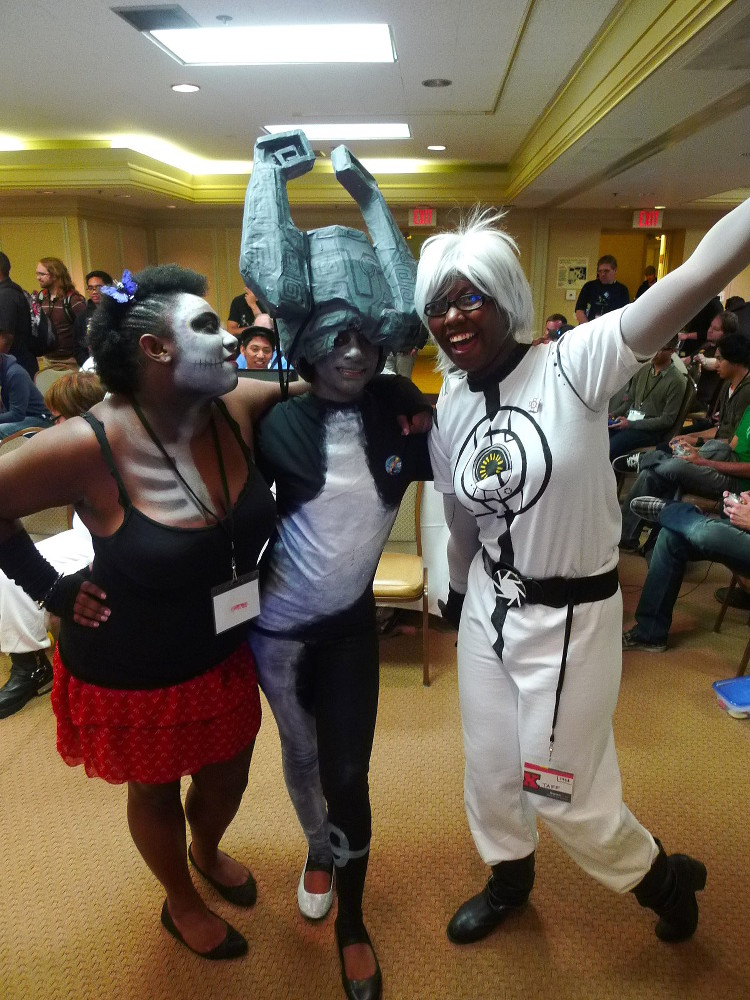
Mia as Betty, a character she invented; Angela as Midna from Zelda: Twilight Princess; Tiffany as Space Core from Portal
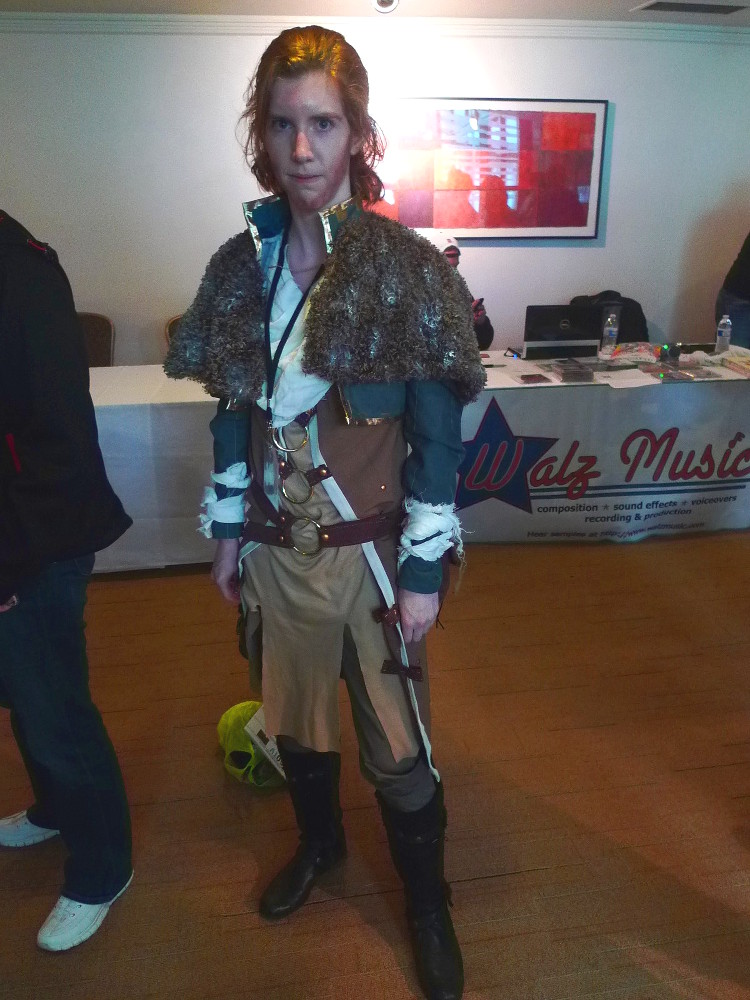
Jasmine as Anders, Dragon Age 2 (Anders was accompanied by awesomely decked out Merrill and Hawke, but my camera failed me)
If you are in one of these photos and would like to correct a caption, or simply want your photo taken down, please let us know!

